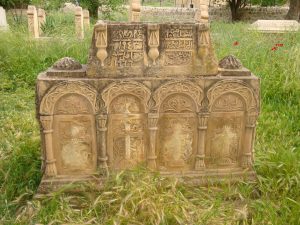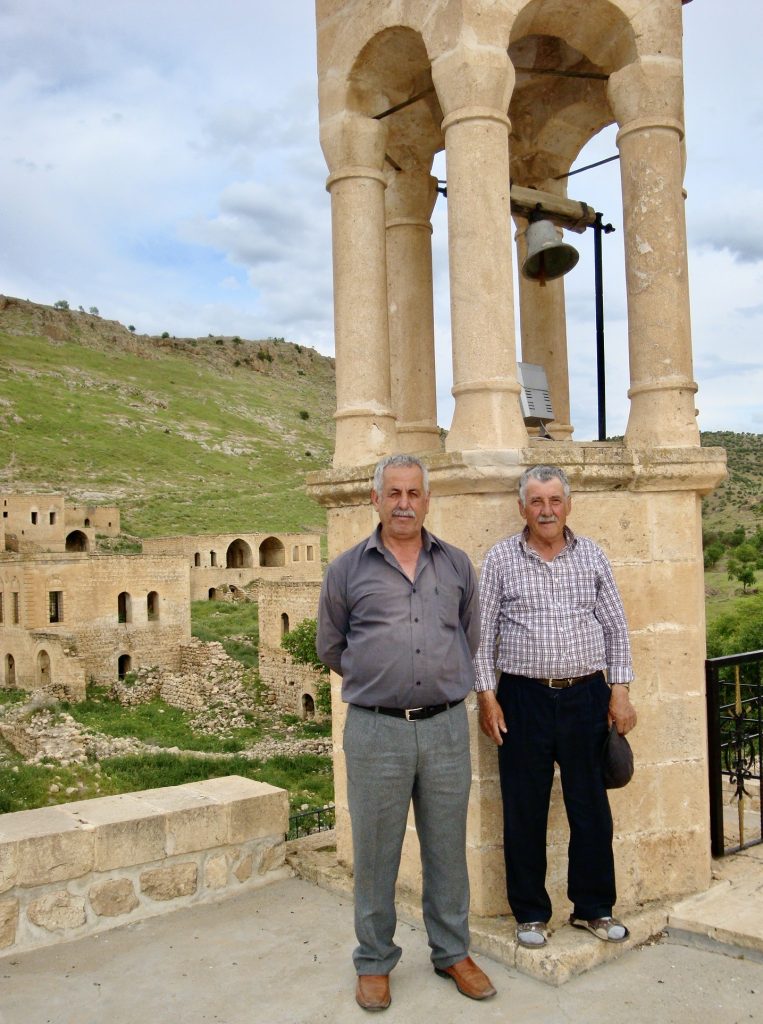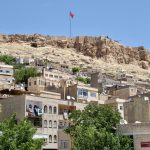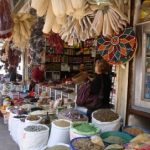What bliss to wake up in Mardin in boutique luxury rather than home-stay squalor! I wander downstairs and find the breakfast room indoors which is a great disappointment. You can carry your plate upstairs to the terrace and feast your eyes on the great flat Plain of Mesopotamia unfolding into the distance until eventually it seems to merge with the sky. “The sea,” the locals call it, and I can certainly see why. I, though, prefer to spread myself out on a carpeted taht, one of the lovely wooden thrones that people in these parts put on their roofs so that they can sleep outdoors in the searing heat of summer. I have to share it with a small jumping spider which is mildly unnerving since I don’t know whether it bites. Otherwise, though, this is my idea of heaven,
Rebecca is off to take photos in the market so I whip around a few of the new hotels that have opened in the old town. Not so long ago there was nowhere decent to stay there. Then came the Erdoba, then the Artuklu Kervansaray and now the floodgates have opened. It looks to me as if Mardin will go the same way as Göreme with all the old houses being sold for ever more inflated prices as hotels, good for tourists perhaps (except that they will all be in the boutique price range), not so good in terms of retaining any semblance of traditional life.
In the afternoon we hang about for the old-fashioned kind of dolmuş that only leaves when it’s full and head for Savur. a mini Mardin to the north-east where there’s superb home-stay-style accommodation to be had at the Hacı Abdullah Bey Konaği. I’ve been there before and still remember the glorious Ottoman-style sitting room on the top floor of a stone house that looks almost fortified. Then I was just visiting. Now we plan to stay, and it turns out we’re not only the ones with that idea which means, sadly, that we can’t have either of the Ottoman-furnished bedrooms but must choose between a so-so normal room and the family sitting room. We opt, rather selfishly, for the latter which has a great view out over the old town and soon our laundry is being taken away for washing and we’re heading out to take a turn round the lovely, honey-coloured back streets. Just doors away I hear a trilling sound and there, sure enough, are the same kestrels that were nesting here on my last visit.
Then people had told me about Dereiçi, a small village nearby which they told me had an old church. This time we hop a taxi and head out there along a road so lush with vegetation that in places it forms an arch over the road. The village, when we reach it, is almost abandoned and its last few inhabitants are sitting in a circle with their sheep in the shade of a spreading plane tree. One of them immediately jumps up to take us to the church and as we drive towards it we glimpse a succession of lovely old stone houses, their Suryani inhabitants long since fled to Europe. There were actually three churches, we are told: the main Syrian Orthodox one, which has just been restored, a Syrian Catholic church and a Protestant one. It’s the Syrian Orthodox church of Mor Yuhanun that we visit with the local muhtar and a caretaker.
Inside I’m surprised at how good it looks, the stonework immaculate, the painted church cloths – a Mardin speciality – spotlessly clean. But almost more striking than the church itself is the enormous elaborately carved tomb just outside the door. At this point the muhtar starts telling us how his predecessor was shot dead and I begin to realise some of the trauma experienced in the 20th century by the population of the Tur Abdin, the Mountain of the Servants of God. But already the men are striding around the side of the church where steps lead up to the roof. There, beside a bell-tower added in the last century, we gaze out on the empty-eyed windows of the abandoned houses, each of them a dead ringer for those of Cappadocia.
Dereiçi was fascinating and I could have lingered for hours but time is ticking on and we have a dinner date back at the Hacı Abdullah. There our washing is waiting freshly pressed on the couch and enticing smells are emanating from the kitchen. We share our supper with a Turkish couple who live in Erenköy in İstanbul and his mother who’s from Diyarbakır, as well as with a Belgian couple and a French man who works in Emirgan and his son, over on a visit from Paris. It’s a grouping that works surprisingly well, and, even though we’ve landed the couches, I sleep like a log afterwards.
Written: 26 May 2011



